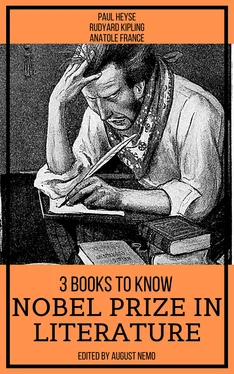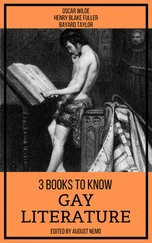"Balder has hit the nail on the head, as usual," said Edwin.
Mohr turned. The brothers noticed that he was winking rapidly, as if desiring to make way with a suspicious moisture.
"It would be beautiful, if it were true," said he. "But this is only the bright side of my virtuosoship; it has its shadows too, and they grow broader than I like. I can see nothing that is complete and in harmony with itself, without envy; no self-satisfied stupidity, no broad-mouthed falsehood, no snobbish faces. And as if these worthies had really no right to be happy, the demon of envy induces me to say something cutting, merely to show them their own pitifulness. Thus in a short time I had all my worthy fellow-citizens about my ears, and wherever I went was decried, avoided, and warned off like a mad dog. It makes all the blood in my body boil, when I see how everywhere the scamps get on in the world, and how the honest fellows, who don't use their elbows, remain behind. You, for instance, if I had my way, should be driving in a handsome coach with servants at your command, as beseems the aristocracy of the human race. Instead of that, that insignificant fellow, Marquard, whom I met below, has his equipage, and graciously nods as he drives by, after reconnoitering me from top to toe through his gold spectacles. Death and perdition, who can see such things and not go wild—"
"Don't abuse our medical counsellor," said Edwin. "In spite of all you have said he is a good fellow, and his carriage would suit my trade and Balder's as little as my slow-stepping scientific methods would suit his empirical gallop. Besides—"
At this moment they heard from the windows below, the first bars of the overture to Glück's "Orpheus."
Mohr approached the window again, and listened attentively.
"Who is playing?" he asked after a time, in an undertone.
"One of the inmates of the house, a young lady of whom we know little more than that she gives music-lessons. Last night—I have not yet told you of it, Balder—I found her absorbed in Schopenhauer's Parerga. She spoke enthusiastically about the chapter on 'the sorrows of the world.'
"Her music bears witness that in those sorrows she had had experience," said Mohr. "Women only play as she does when their hearts have been once broken and then pieced together again. It is with them as it is with old violins, which must be shattered several times before they have the right resonance. But hush, it is growing still more beautiful."
He sat down on the window-sill, and, gazing without, became completely absorbed in listening. Balder worked noiselessly at his little boxes, while Edwin had taken a book though his gaze became fixed upon one page. It was so quiet in the room, that during the pauses in the music, they could hear the stealthy footsteps of the cat, which had just previously leaped into the chamber, and eaten the remnants of the breakfast.
––––––––
About the same time that these things were occurring in the back building, the master of the house was in the shop talking with a customer, who had just brought to be mended a pair of embroidered slippers, carefully wrapped in an old newspaper.
It was somewhat unusual for the shoemaker to be absent from the workroom at this time of day. But it was also, as the reader will remember, an unusual occasion, Reginchin's birthday, and her mother, who generally attended to the management of everything in the shop, was obliged to give up the charge to her husband, in order to go into the kitchen and mix the dough herself, for the usual birthday cake. She would not relinquish this task, though there was a confectioner's shop at the very next corner. For ever since Reginchin was four years old, she had been very fond of a certain kind of home-made plumb-cake, and, though she could rarely do anything exactly to her mother's mind, and was continually subject to her criticism, the young girl was, as she very well knew, the apple of her mother's eye, and, for her the good woman would have gone through fire. So, hot as the day was, Madame Feyertag stood without a murmur beside the servant at the fire, allowing herself to be troubled but little by the principal anxiety which usually rendered her unwilling to have her husband in the shop: the jealous fear that some female customers might come in, and that the shoemaker might find other feet, whose measure he would be obliged to take, prettier than those adorned with the legitimate slippers of his wife.
To be sure the worthy man, though he might have been a sly fellow in his bachelor days, had given very little cause for such a suspicion during twenty-three years of extremely peaceful married life. But within a few months a change had taken place which attracted the attention of his clever wife; a change not much apparent in his actions and conduct, since he quietly continued his regular mode of life and did not even oppose the before-mentioned slippers, but noticeable in his language. She was already accustomed to hear him talk much of progress, and inveigh against all tyranny, especially domestic slavery, giving utterance to very forcible expressions, and this harmless amusement she willingly countenanced, since all affairs of state and family pursued, as before, their even course. But during the last three months his revolutionary table-talk had changed its tone, and had been steadily pointed against "women," of whom he repeated the most malicious things, usually in strange, outlandish words. Perhaps he had merely picked up these contemptuous epithets at the liberal trades-union, to which he owed all his progressive ideas; and if so, it was something to be thankful for. But except on certain festive occasions, women were excluded from these meetings, and at the entertainments a very decorous tone always prevailed, to say nothing of the obligatory toast to the fair sex. So, when all at once in speaking of "women," he used the word "females," and talked of the "sex" with a shade of contempt, for which Madame Feyertag's person and conduct did not give the slightest cause, nothing was more probable than that the shoemaker had obtained his new knowledge of feminine nature in other circles, and, perhaps led astray by some acquaintances formed in the shop, had approached nearer to the light-minded portion of the sex than could be at all desirable for the peace of the household. Since that time, Madame Feyertag had kept a sharp eye on the secret sinner, no longer permitting his presence in the shop, and had emphatically forbidden the utterance of his offensive remarks, at least in Reginchen's presence. For this restraint the worthy man indemnified himself by talking all the more freely to others, and on this very morning, when, contrary to his usual custom, we find him in the shop, he was in the act of giving vent to the pent-up emotions of his heart. Compelled to keep silence, his companion with some little surprise, patiently submitted to the torrent of his eloquence. He was a little old-fashioned gentleman, with a timid but lively manner, whose delicate regular features bore an expression of such winning kindness that the most casual observer could not fail to notice it; his was one of those faces, which, in consequence of the delicacy of the skin, become prematurely withered, and yet never grow old. A small grey moustache endeavored in vain to give a martial air to the innocent childish face, and the forehead, which, through baldness, seemed to reach to the crown of his head, failed just as signally to cast upon its owner the air of a deep thinker. Yet when any important subject was under discussion, the mild eyes could sparkle with a strange fire, and the whole face become transfigured with interest and excitement.
This little man wore a neatly brushed but rather threadbare coat, cut in a fashion that had prevailed ten years before, and a large white cravat, fastened with a pin containing a woman's picture. He had placed upon the counter an old-fashioned grey hat, with a piece of crape twisted around it, and, with both hands resting on his cane, he sat opposite the shoemaker, who had just examined the slippers, and said that they could be mended so as to look very well, only that a part of the embroidery would be lost.
Читать дальше












